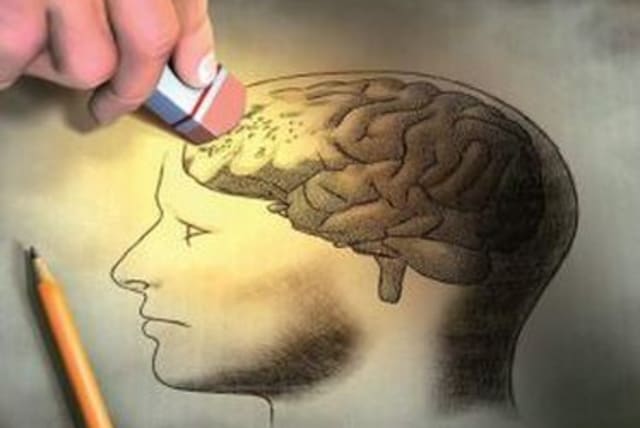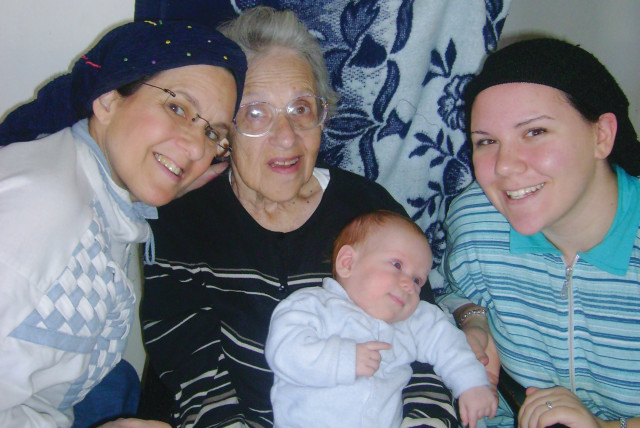'Now You Are Here': For those caring for loved ones with Alzheimer's - review

Sarah Goldstein’s fourth book, Now You Are Here: Navigating Nursing Home Care for a Loved One, was specifically written for those caring for a loved one residing in a nursing home.
Sarah Goldstein’s mother, Leah Krupit, lived with Alzheimer’s disease for a quarter of a century. She survived more than twice as long, in some cases five times longer, than most people who are diagnosed with Alzheimer’s disease or another form of dementia.
Bringing her mother to Israel and caring for her during her final years made Goldstein, now living in Ramat Beit Shemesh, somewhat of an expert.
“An estimated 6.7 million Americans aged 65 and older are living with Alzheimer’s today. This number could grow to 13.8 million by 2060, barring the development of medical breakthroughs to prevent, slow, or cure it. In Israel, the number of people currently suffering from dementia is estimated at 150,000,” Goldstein said.
With a background in social work, a long career as a birth doula, and now as a trainer of the next generation of doulas, helping people navigate medical systems comes naturally to her. Goldstein took all the knowledge and experience she gained from 18 years of caring for her mother and published a guidebook for adult children and spouses of people with dementia.
Helping caretakers, family of dementia patients
Although multiple resources already exist for caretakers of dementia patients, Goldstein’s fourth book, Now You Are Here: Navigating Nursing Home Care for a Loved One, was specifically written for those caring for a loved one residing in a nursing home. “My strong point is guiding them through the nursing home system once their loved one is there,” she asserted. “It’s really hard to go it alone.
“There is an elephant in the room that few people want to speak about, let alone think about: the plight of our elderly parents or spouses who suffer from some sort of dementia and need ongoing care, whether at home or in a nursing home. Because of this silence, the caregiver for this loved one is often left to bear the burden alone,” she said.
“I wrote Now You Are Here to give support and practical tips to people in this situation. I wrote this book from my own experience.” Indeed, the pages of Now You Are Here are filled with plainspoken advice from a veteran caregiver.
Some tips, like investing in family counseling when siblings are not in alignment about how best to care for a parent with Alzheimer’s, are things a caregiver would recognize as common sense if they weren’t so overwrought by the condition of their loved ones. Other tips, such as providing bright clothing and scented grooming products to make it more pleasant for staff to care for one’s loved one, and printing a list of specific patient preferences for overworked and poorly paid aides, are clever hacks that Goldstein discovered and generously shares with other caregivers.
Now You Are Here offers a plethora of concrete suggestions interspersed with personal stories of Goldstein’s experiences caring for her mother. Her suggestions cluster into three main topics: caring for patients with dementia; supporting the nursing home staff; and self-care.
Goldstein is a born nurturer, and it’s clear that empathy is one of her strongest qualities. Raised in Philadelphia, she graduated from college with a bachelor’s degree in social work. After graduation, she bought a $100 bus ticket and traveled across the United States. It was in California that she, a previously non-observant Jew, first connected with Chabad. “My mother wasn’t too happy [about it],” she admitted with a grin.
Her Chabad mentor sent her from warm and sunny California to the frozen streets of Minnesota to study Torah with Rabbi Manis Friedman for six weeks in the middle of winter. Her Torah study continued in Crown Heights, a neighborhood in Brooklyn, New York, dominated by the Chabad movement, where she worked as the director of a youth center.
Twice the victim of crime in Crown Heights and wanting to avoid what she was told was a rise in crime during the summer, Goldstein left New York and continued her Torah studies at Machon Alte in Safed.
“It was really primitive, but it was gorgeous. Talk about cultural adjustment!” she remarked about her first impression of Safed in 1981. Her adjustment was ultimately successful, and she’s been in Israel ever since.
Goldstein met her husband, Moshe, who was working for the Jewish Agency in Safed. The couple now has six children and 18 grandchildren. The distinctive educational needs of one of their daughters eventually brought the family to Jerusalem, where Goldstein’s passion for being a doula was ignited by a small ad for people who wanted to learn to support women giving birth.
“I got so passionate about birth and wrote Special Delivery: Special Jewish Birth Stories of Faith and Inspiration. I wanted to inspire women to be aware [of their own] strength and to trust in their bodies,” she related.
Special Delivery, published in 2004, was followed by More Special Deliveries, and then A Doula’s Journey: Into the World of Birth in 2014. Later, she opened 12 pregnancy and childbirth lending libraries in Israel, mostly in the greater Jerusalem area.
During the time Goldstein was writing her third book, Krupit, who was living in the US, was diagnosed with dementia. Goldstein’s older sister managed their mother’s care with the help of an aide until it became too much.
Just two months before her oldest daughter’s wedding, Goldstein was asked to take over the care of her mother. “My mother wasn’t religious, and she was not a Zionist, but her grandchildren were in Israel,” Goldstein said. Thus Krupit came to Israel for a family wedding 18 years ago and never left.
Initially, Goldstein set her mother up in an apartment with a full-time aide, but it soon became obvious that she would need the more intensive attention of a nursing home. That’s when Goldstein discovered that most nursing homes are chronically short-staffed and the workers are painfully underpaid.
In addition, Goldstein observed that some family members didn’t know how to behave once they entered a nursing home. “I would see people coming in and not helping their loved ones. Some visitors came and didn’t interact with their loved ones at all,” she reported.
Goldstein insists that the care available in Israel is much better than what she hears about in America, particularly in the areas of cleanliness and staffing. “They really try to do what’s best for the residents,” she said. Nevertheless, “when all is said and done, the situation of this disease, or anyone in an old age home, is lousy.”
Ultimately, Krupit was in Israel’s health care system, in four different nursing care facilities, for 15 years before Now You Are Here was first published in 2021. “Although my mother’s longevity may have been rare, dementia isn’t,” she commented. “It’s critical for caregivers to get a lot of support from friends and family.” She also recommends making spot checks by visiting the nursing care facility during off hours.
Even with well-meaning staff, the involvement of the family is crucial. “People with Alzheimer’s disease develop interesting, quirky habits. My mother bit her lip to [the point] where it was split,” she related. The staff dismissed it as a meaningless habit, but it turned out that her mother was biting her lip because she was suffering from serious dental pain that necessitated multiple dental treatments under anesthesia.
When dementia patients get to the stage where “they can’t express themselves, it’s like trying to guess what’s wrong,” she explained.
On the advice of healthcare workers, Goldstein had her book translated into Hebrew, and the second edition was published in 2023. “This guide is essential for families to read and have access to as they journey down this difficult path,” said Sara Oberstein, nurse manager at Hod Amal, a geriatric facility in Ma’aleh Adumim.
Looking back on her experience, Goldstein reflected, “Everyone in life has nisyonot [trials]. I tried to look at it with faith.
“Some people have tests with parnassa [livelihood] or with children who aren’t healthy. I just accepted it and went on.”
The writer is a freelance journalist and expert on the non-Jewish awakening to Torah happening in our day. She is the editor of Ten From The Nations and Lighting Up The Nations.
Jerusalem Post Store
`; document.getElementById("linkPremium").innerHTML = cont; var divWithLink = document.getElementById("premium-link"); if (divWithLink !== null && divWithLink !== 'undefined') { divWithLink.style.border = "solid 1px #cb0f3e"; divWithLink.style.textAlign = "center"; divWithLink.style.marginBottom = "15px"; divWithLink.style.marginTop = "15px"; divWithLink.style.width = "100%"; divWithLink.style.backgroundColor = "#122952"; divWithLink.style.color = "#ffffff"; divWithLink.style.lineHeight = "1.5"; } } (function (v, i) { });

